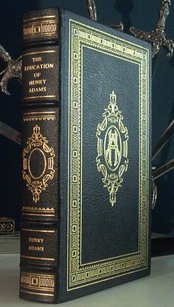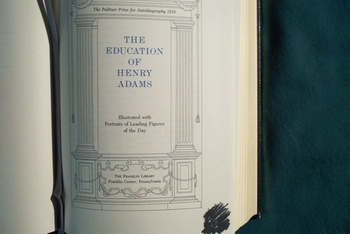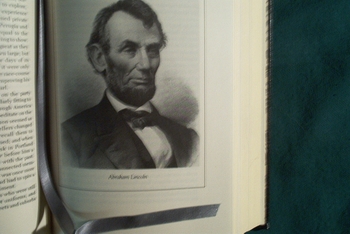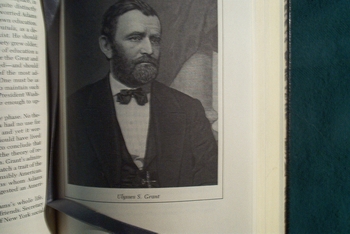Easton Press Henry Adams books
The Education of Henry Adams - The Collector's Library of Famous Editions - 1970Franklin Library Henry Adams books
Mont Saint Michel and Chartres - 100 Greatest Masterpieces of American Literature - 1978
The Education of Henry Adams - 100 Greatest Masterpieces of American Literature - 1980
The Education of Henry Adams - 100 Greatest Books of All Time - 1982
The Education of Henry Adams - 20th Century's Greatest Books - 1982
The Education of Henry Adams - Pulitzer Prize Classics - 1983
Who was Henry Adams?
Henry Adams, born on February 16, 1838, into one of America's most distinguished families, was a prominent historian, educator, and author. He was the great-grandson of President John Adams and the grandson of President John Quincy Adams, giving him a unique perspective on the evolving political landscape of the United States. Adams was born into privilege and received an exceptional education. He attended Harvard College, graduating in 1858, and later studied law in Germany. However, his true passion lay in literature and history. Adams embarked on a career as a journalist, writing for prominent publications such as the North American Review.
In 1870, Henry Adams began his academic career as a professor of medieval history at Harvard, marking the beginning of his long association with the university. He devoted much of his time to scholarly pursuits, and his historical works, including History of the United States During the Administrations of Thomas Jefferson (1889-1891) and Mont-Saint-Michel and Chartres (1904), were well-received for their depth and analytical insight.
One of Adams' most famous works is The Education of Henry Adams (1907), an autobiography and reflection on the intellectual and cultural shifts he witnessed during his lifetime. In this work, Adams explored his experiences and the challenges posed by the rapid technological and societal changes of the late 19th and early 20th centuries. Adams' writing style was characterized by a blend of historical analysis, philosophical reflection, and a keen sense of irony. His works often delved into the complexities of power, politics, and the human experience.
Henry Adams' influence extended beyond academia and literature. His relationships with prominent figures of his time, including politicians and intellectuals, offered a unique perspective on the social and political dynamics of the Gilded Age and the Progressive Era.
Henry Adams died on March 27, 1918, leaving behind a legacy as a prolific scholar and a keen observer of American society and politics. His contributions to historical writing and his ability to grapple with the intellectual challenges of his era continue to be studied and appreciated by scholars and readers interested in the intricacies of American history and thought.
The Education of Henry Adams
At its core, The Education of Henry Adams is a bildungsroman—a coming-of-age story that traces Adams' quest for knowledge, meaning, and self-discovery. Through his encounters with luminaries such as Ralph Waldo Emerson, Henry James, and John Hay, Adams grapples with the complexities of American democracy, the impact of science and technology, and the inexorable march of history. Yet, Adams' education is far from linear or conventional. As he delves into diverse fields such as history, philosophy, and science, he confronts the limitations of human understanding and the enigma of progress. His narrative is marked by a sense of irony and disillusionment, as he reflects on the paradoxes and contradictions inherent in American society and culture.
The Education of Henry Adams is more than just a memoir—it is a meditation on the nature of knowledge, power, and the human condition. Adams' prose is at once erudite and introspective, as he grapples with questions of identity, agency, and the elusive pursuit of wisdom. Since its publication, The Education of Henry Adams has captivated readers with its incisive insights and lyrical prose. Adams' legacy endures as a testament to the enduring power of intellectual curiosity and the quest for self-knowledge—a journey that transcends time and place, and continues to inspire generations of readers to this day. In 1907, Adams began privately circulating copies of a limited edition printed at his own expense. Commercial publication had to await its author's 1918 death, whereupon it won the 1919 Pulitzer Prize.
Mont Saint Michel and Chartres
Henry Adams quotes
"A teacher affects eternity; he can never tell where his influence stops."
"Chaos often breeds life when order breeds habit."
"No man means all he says, and yet very few say all they mean, for words are slippery and thought is viscous."
"Knowledge of human nature is the beginning and end of political education."
"The Indian Summer of life should be a little sunny and a little sad, like the season, and infinite in wealth and depth of tone, but never hustled."
"Practical politics consists in ignoring facts."
"A friend in power is a friend lost."
"All experience is an arch where through gleams that untraveled world whose margin fades forever and forever when I move."
"Every man who has at last succeeded, after long effort, in calling up the divinity which lies hidden in a woman’s heart, is startled to find that he must obey the God he summoned."
"Nothing in education is so astonishing as the amount of ignorance it accumulates in the form of inert facts."




Comments
Post a Comment
Share your best book review and recommendation